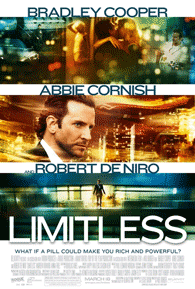
Limitless may be “Flowers for Algernon” by a different name but certain compromises need to be made to the story’s plot and morals due to how modern doctors and psychologists tend to overprescribe medication. If we already have Ritalin in real life, how far fetched is a wonder genius drug? But where Daniel Keyes could use this sci-fi premise to ruminate on phenomenology of the self or medical ethics, this moral clause is out of our reach precisely because of how prescription medication has become so accepted in society.
What Limitless reaches for then is pulp thriller territory: conspiracies, cover-ups, blackmail, and murder. It is strange then to note that the thriller part of Limitless is merely decent to average thanks to a script that is too conventional and predictable at turns (Russian gangsters! Wall Street sharks! Mysterious stalkers with facial scars!) to engage an audience expecting a tricky thriller. I would not have expected the film to work out this way given its intriguing and smart premise.
It turns out Limitless does have several strong points even though none of them are in the script department. Given that this is still a film about drug-taking, the cinematography is inventive in conveying changes in perception and mood. Basically when Bradly Cooper’s meds kick in, the whole world starts to look like some 1990s music video directed by Michel Gondry. While Bradley Cooper is not exactly leading man material, he exhibits a wide acting range that is reminiscent of Scott Bakula’s in Quantum Leap.
For some, Limitless may not exactly be food for thought but it sure is eye candy.

